Mozambique will, this year, rebuild 104 health units affected by cyclones - government
Mozambique: Cyclone Idai, slow return home in CDg, IMF key role in coal – By Joseph Hanlon
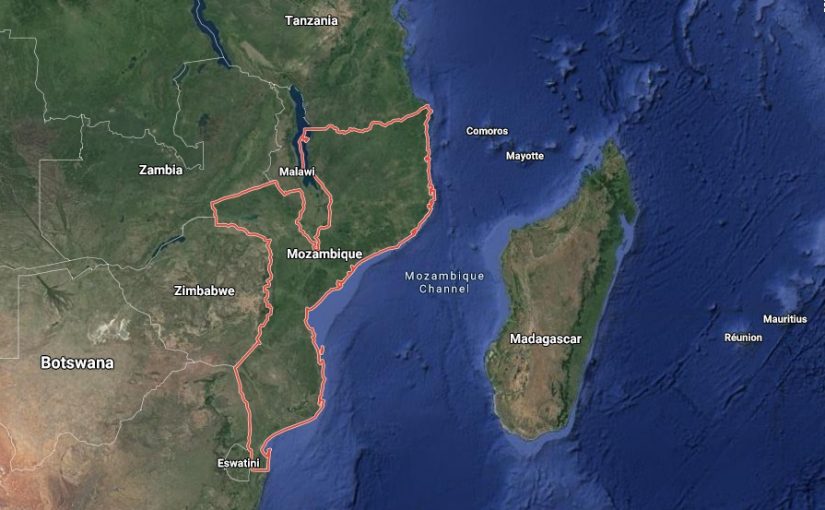
Image: Google Maps
In this issue
Climate change
- Little recovery from 2019 cyclone Idai
Cabo Delgado
- Slow return home
- Colonial boundaries matter
- New Total head implies return
Economy
- Moz is resource economy
- IMF wrongly pushed Moz into coal
Secret debts trial
- 7,427 bottles of wine
- Slow recovery from 2019 cyclone Idai; climate change caused worst disaster
Cyclone Idai, which hit Beira in 2019, caused the greatest economic loss of any natural disaster in Africa in the past 50 years- $2 bn – according to a new atlas published 1 September by the World Meteorological Organization. https://library.wmo.int/doc_num.php?explnum_id=10769
But reconstruction and recovery has been very slow, after cyclones Idai and Kenneth hit the country in March and April 2019, more than two years ago. Many projects are only starting next year, three years after the cyclone. This is because of coordination failures, the need to integrate resilience into projects, the procedures required by cooperation partners, and the multiplicity of these partners, which are delaying the reconstruction process, according to the director of the Office of Post-Cyclones Idai and Kenneth Reconstruction (GRECOP), Luís Paulo Mandlate.
Distrust of corruption in Mozambique is a key issue. Donors promised $1.6 bn, then confirmed only $1.2 bn. Mandlate admitted that of that, only 23% is under the direct management of GRECOP. Donors channelled their money through many different International Non-Government Organisations (INGOs) which then refused to cooperate or inform the government of what they are doing. “We have a huge number of agencies that are implementing activities, which receive resources directly from the partners,” he said. And they provide no information on the physical work or on the financial component, the execution and the audits that should be done to these agencies.” (Noticias, Carta de Mocambique 12 Aug)
The World Bank has disbursed $440 mn to state institutions such as Social Action, Roads, Water, etc. UNDP is managing its $70 mn directly.
In central Mozambique, there are still 73 resettlement sites hosting 93,000 people displaced by Cyclone Idai in 2019, according to the UN’s International Organization for Migration. (IOM 17 Aug) Beira will start a project next month (September) to build or repair 15,000 houses, with $42 mn from the World Bank. Houses will be only for vulnerable families such as the chronically ill, the destitute elderly, orphans and child headed households.
Last year 54,000 households in the worse hit areas of Búzi, Gorongosa, Muanza, Nhamatanda and Beira received $120 each and received a similar amount in July this year, according to the National Institute of Social Action.
Rehabilitation of Samora Machel secondary school in Beira is nearing completion. The work is financed with $1.5 mn from UNDP under the supervision of GREPOC and the management of the Sofala Provincial Directorate of Public Works and Housing. Several other schools will reopen later this year. (Noticias 30 Aug)
A new municipal building to house several departments whose offices were destroyed by Idai is finally going out to tender. The project is funded by the Dutch Enterprise Agency and will go to a local company, supervised by the municipal development company. Construction of a new coastal protection wall and water and drainage systems, with $120 mn from the Netherlands and World Bank, should start next year.(Noticias 31 Aug)
Cyclone Idai (4-16 March 2019) is now accepted as a cyclone made worse by climate change. The year 2019 was among the second warmest years since records began in the mid 1800s. Only 2016 was warmer. The high temperatures in 2019 had a particular impact on in the Indian Ocean.
Cyclone Idai was the deadliest tropical cyclone ever recorded in the Southern Indian Ocean basin. Over 1300 people lost their lives, and 3 million people were affected or displaced across Mozambique, Zimbabwe, Malawi, and Madagascar. Cyclone Idai was the longest-lived tropical system on record in the Mozambique Channel, while Kenneth (23-26 April) became the strongest storm on record to make landfall in Mozambique. (Bulletin of the American Meteorological Society,
State of the Climate in 2019, https://doi.org/10.1175/2020BAMSStateoftheClimate.1)
Cabo Delgado
- Slow return home
Faced with contradictory messages of “move now” and “don’t move until we are better prepared” , displaced people are slowing returning to some zones cleared of insurgents. The southernmost occupied zone has been Quissanga district, where 95% of the population fled. Rwandan troops are still clearing out insurgents. Work started 29 August to repair the only east-west road in the district, starting at 19 October village on the main paved N380 which goes north to Macomia. The road will be repaired for 27 km east to Bilibiza and then east to Quissanga town. This is funded by $100,000 from UNDP with the work carried out by the northern development agency ADIN.
In Palma, people who had fled to nearby Quitunda are now slowly returning to zones protected by the Rwandans. Formal return started on 28 August. A MediaFax reporter was present and wrote that “before boarding the buses and military trucks, people are carefully registered and even searched, to ensure that there are no infiltrators returning to the village of Palma. The local leaders are directly involved in the process.” Some market stalls have reopened but much infrastructure was destroyed and basic social services such as water supply and medical assistance are being provided on an ad hoc basis.
Mocimboa da Praia is still an entirely military zone and local people cannot yet return. (MediaFax 30, 31 Aug; Pinnacle News 29 Aug; New Times Rwanda 30 Aug; Sala da Paz 16 Aug)
In Macomia the district town has been government controlled for some time. Local traders have been given roofing sheets and sewing machines were distributed to some refugees. But there is still fighting along the coast, particularly in Mucojo.
Many people want to return home, but some do not. Pinnacle News (25 Aug) reports the municipal authorities in Chiure are selling 30 m x 25 m plots to displaced people for $10.
- Suddenly, colonial boundaries matter
The Berlin conference of 1884-5 set the colonial boundaries between Portuguese Mocambique, German Tanganyika, and British Kenya. Lines were drawn on maps that meant nothing to local people. The idea of creating a Makonde nation from southern Mozambique and northern Tanzania was important in the 1960s. The idea of an Islamic Swahili coast from Somalia south to Ilha de Mocambique exists in practice. Extended families and trading partnerships go across borders, and people go back and forth without worrying about border formalities.
The East African (Nairobi, 28 Aug) reports that “The rout of Islamist insurgents in Cabo Delgado, northern Mozambique, by Rwandan forces has set off alarm bells in Kenya and Tanzania, where some of the fighters originate, with intelligence agencies on high alert after reported re-entry of some of the fleeing suspects.”
On 23 August Kenyan security personnel in Mombasa arrested two suspected terrorists, one of whom is Tanzanian, and found two AK-47 rifles and explosive-making materials in their car. Police said they were suspected of planning to blow up several installations on the anniversary of the death of radical Muslim cleric Sheikh Aboud Rogo, who was shot dead on August 27, 2012 in Mombasa.
Two accomplices got away, but police in Mombasa told The EastAfrican the accomplices had recently been to Mozambique and the DRC. In March, Kenyan intelligence reports flagged several citizens, especially from the Coast region, as having joined the ranks of the Mozambique insurgents. The reports indicated that several youth who had been radicalised by the late Aboud Rogo were among those who went to northern Mozambique.
Borders do not matter and Swahili speakers with family and business links can clearly pass between the three countries un-challenged
- Total names new Mozambique head and prepares to return
TotalEnergies new Mozambique head is Maxime Rabilloud, who served three years as General Council for Total, and before that six years in Brazil ending up as CEO. Naming someone of that stature says Total expects to restart once the Rwandans have created the security zone. African Development Bank president Akinwumi Adesina told Reuters (27 Aug) that with the Rwandan success he expected Total to resume in 12 to 18 months. It is widely believed that ExxonMobil will not go ahead with its part of area 1, and Rabilloud is also a mergers and acquisitions expert, and thus may be aiming to take over the ExxonMobil concession.
- Zitamar: Fungibility and future gains are behind Rwanda’s involvement in Moz
“What does Rwanda stand to gain from its Mozambique deployment?” asks Zitamar (31 Aug; paywall). No one admits to funding the army to go to Mozambique, but Rwanda is very aid dependent, and aid is “fungible” – that is, a $ or € goes into a government bank account to pay for health or education but all $s and €s are the same, so an increase in aid increases government spending. (Similary electricity and gas are fungible – the electrons and gas molecules probably do not come from the company to whom we pay our bills.)
When French president Emmanuel Macron visited Kigali on 27 May, his speech strongly suggested that Rwanda’s deployment is an extension of French power in Africa. While in Kigali, Macron apoligised for France’s role in the Rwandan genocide – an apology which Kagame, against local expectations, accepted. Along with his apology, Macron offered funding: a €60 million loan to help Rwanda deal with the coronavirus pandemic, and a €1.5m grant to support sports in Rwandan schools. And French public investment bank Bpifrance signed three cooperation agreements to invest with Rwanda’s sovereign wealth fund, Agaciro. So France has put a lot more money on the table.
Both the US and UK have been increasingly criticising President Paul Kagame on human rights grounds and threatening to cut aid. But the US is anxious to use Mozambique as a base to attack militant Islam in Africa. US diplomats are reported to have approved the Rwandan deployment. And the US ambassador to Rwanda has been transferred to Mozambique. All of which suggests that US aid will keep flowing and perhaps increase, to keep Rwandan troops in Mozambique.
So increases in French, US and other aid, plus fungibility, could make the military intervention profitable. And here are two side deals, notes Zitamar. After its intervention in DRC, Rwanda also became involved in minerals there, so Rwanda might be eying Cabo Delgado minerals. And Mozambique hosts some Rwandan dissidents. In late August two Rwandan refugees were arrested, held at a Matola police station for 24 hours, and then released after an outcry by the local Rwandan community – a very useful marker of support to Kagame.
Finally, Zitamar notes: “Multiple sources told Zitamar that it was Mozambique – not France – that initiated the idea of the Rwandan intervention, saying that President Nyusi should take the credit for the initiative.”
Retreating insurgents are leaving numerous messages in classrooms and on walls, many of which tell what the insurgents say they are fighting for. By failing to collect and study those messages, researches and the government are losing critical information about the motivations of the insurgents, writes Pinnacle News (29 Aug)
Mocimboa da Praia had become the insurgent capital, according to a long interview with a young man held captive there, published in Evidencias (24 Aug, in Portuguese on https://evidencias.co.mz/2021/08/26/evidencias-ed-029/ page 3) “In Mocimboa, they had everything,” he said, including generators to power pumps and communications equipment, as well as ample food brought from Palma. The insurgents main fear was helicopters, so no one was allowed out during the day, but normal life resumed at night. He says it was the base of the leader, Bonamade Machude Omar.
The economy
- Nyusi confirms Moz is resource economy
Foreign sales are concentrated on five products “that make up 81% of total exports: aluminium bars and cables, coal, electricity, heavy sands and natural gas,” said President Filipe Nyusi, speaking Monday 30 August at the opening of the Maputo International Fair (FACIM) in Ricathla, Marracuene, on the edge of Maputo. Due to Covid-19, exports fell 23% in 2020 compared to the previous year, the President said.
“In terms of investment, in the first half of this year, projects were approved totalling $753 million; the energy sector is the most important,” he said. (Diario Economico, 31 Aug)
- New study says IMF wrongly pushed Mozambique into coal
The IMF’s excessive optimism around fossil fuel revenue streams and potential growth opportunities pushed Mozambique to greater fossil fuel expansion as a key driver of the economy. But the optimism was not merited and Mozambique has been left with debts for IMF-promoted coal mining, according to a study by Bretton Woods Project and Action Aid released in August.
The “IMF displayed unwarranted optimism on coal’s potential in Mozambique,” says the study. It “promoted optimistic assumptions of future revenues from coal leading to expanded fiscal space, and predicted increased inward foreign investment and increased export-led growth.” The 2013 Article IV report predicted that Mozambique would become “one of the world’s leading coal exporters.” New gas and coal megaprojects were estimated to add 20% to GDP growth by 2023. Government revenues from coal were predicted to reach 1.6% of GDP. By 2023, alongside gas, this was estimated to account for a “quarter of all revenues.”
In 2015 Reuters (28 July 2015) reported that a coal conference in Maputo concluded “Mozambique’s coal rush is officially over”. But the IMF did not agree. It encouraged public spending for infrastructure projects to support coal expansion. For instance, it gave enthusiastic support for the expansion of the Nacala rail corridor which i predicted in the 2016 Article IV report would help to triple exports, add to economic growth, and help boost government revenues. The IMF also focused its technical assistance on tax reforms, including the development of a new tax policy bill in 2014, to give significant tax breaks for coal.
As recently as 2019, the IMF Article IV report noted that Mozambique is “slated for a boom which could make significant contributions to the country’s economic growth and government revenues” – despite clear evidence that the coal industry was in trouble. With environmental pressure and falling coal prices, and in order in order to become carbon neutral by 2050, Vale is closing its doors after 10 years of loss-making. Industry specialists predict that the sale of the plant and railway will be difficult.
The authors looked at reports of what are called “Article IV consultations”, which are the annual IMF investigations and contain what the IMF demands and recommends. While the IMF was demanding fossil fuel subsidy removal for consumers, it was promoting tax breaks fro producers. “IMF advice has entrenched fossil fuel dependency and opened the door to increased investment in coal.” Mozambique is left carrying the can.
It was always a myth that coal would bring a boom, “Mozambique is now saddled with further debt, due to government investments in the Nacala Corridor and other infrastructure projects to support coal,” the report says.
Comment: The IMF approved a $123 mn offshore account from coal: Not noted in this report was that, with IMF encouragement, in November 2004, the government signed a contract with the Brazilian company Companhia Vale do Rio Doce (CVRD) for coal prospecting in Tete, and Vale paid a signing fee of $123 mn (2.2% of GDP), which was deposited in a New York bank with the view of establishing a “savings fund”. This is in the government’s own Memorandum of Economic and Financial Policies submitted to the IMF on 24 January 2005, and posted on the IMF website (Country Report 05/168) https://bit.ly/IMF-Vale-secret.
This promoted both coal and corruption. At a time that the IMF was tightly controlling donor funds to Mozambique, it specifically allowed $123 mn to be held off shore and not accounted in the IMF-controlled state budget – because it was a coal project. And holding the money offshore, the IMF must have known that the Frelimo elite would use it for pet and corrupt projects.
The IMF lesson for Mozambique: if you work with international companies, you are allowed to be corrupt and it will be hugely profitable. A decade later, the secret debt showed now well the lesson was learned.
- Other economic news
Interest rates remain at 18.9%, despite annual inflation being only 5.5%. (Banco de Mocambique 31 Aug, Instituto Nacional de Estatistica 10 Aug) This very high interest rate makes it almost impossible for small businesses to borrow.
Mauritius has become the main regional tax haven, and a recent CIP investigation (https://www.cipmoz.org/en/2021/07/20/8153/) showed that in the past two years Mozambican owners of mining companies have moved their companies to Mauritius. Going in the opposite direction, A new tax treaty with Mauritius designed to curb tax dodging has recently been signed by Lesotho. (International Consortium of Investigative Journalists, 22 July)
Tongaat sugar cut executive salaries, in part due to poor management of its Mozambique sugar estates, Mafambisse and Xinavane. Tongaat Hulett group CEO Gavin Hudson’s remuneration in 2021 was cut to $450,000 from $1.5 mn in 2020. CFO Rob Aitken’s pay package was cut to $440,000 from $900,000. (Moneyweb, 2 Aug) When will Mozambique cut the salaries of bosses of unprofitable companies?
Rogerio Zandamela was named to a second five year term as governor of the Bank of Mozambique, by President Filipe Nyusi on 1 September. (Presidencia 1 Sep) Zandamela was first appointed in August 2016. Previously, he had worked at the International Monetary fund (IMF) from 1988 to 2016. Zandamela took over at the central bank in the immediate aftermath of the revelation of the secret debt scandal. AIM (1 Sep) says “The Bank of Mozambique, under Zandamela’s management, must take much of the credit for pulling Mozambique back from the brink of economic collapse.” But he is also notable for trying to discipline the commercial banks, and in July he took on the oldest bank in the country, Standard Bank. He is also criticised for the high interest rates which create huge profits for the banks but squeeze business.
Standard Bank has been allowed to return to almost normal operations. Formal accusations were never made public, but as part of the still very strange increase in value of the Metical by 13% in a week, from $1 = MT 65.5 on 6 April to $1 = MT 56.8 on 14 April. Millions of dollars could have been made by anyone who manipulated the exchange rate or knew about it in advance (See this newsletter 544, 13 May). Standard appears to have been accused of both, as well as improperly trading currencies abroad. The final settlement requires Standard to only deal in foreign exchange at Bank of Mozambique rates; Standard cannot set it own exchange rate. Standard Bank has been fined 290 mn Mts ($4.5 mn).
A 16 July Bank of Mozambique satement lists in more general terms some of the charges: fraudulent manipulation of the exchange rate, having an illegal payment network based outside the country, carrying out irregular operations of financial derivatives for the hedging of risk associated with exchange rate fluctuation, failure to regularise the terms of commitment of exports, and obstruction of the inspection activity. Charges also related to the 2018 blackout of SIMO (Sociedade Interbancaria de Mocambique), which does electronic funds transfers.
Former Standard Bank officials Chief Executive Officer Adimohanma Chukwuma Nwokocha, and Cláudio Eliazare Banze, Director of the Information Technologies Department, have been disqualified from holding corporate positions and management functions in credit institutions and financial companies in Mozambique for three years. Carlos Domingos Francisco Madeira, Director of Corporate Banking, was banned for six years. Their Linkedin accounts still say they work for Standard Bank, which is believed to be still paying them.
Nwokocha was fined 6.4 mn Mts ($100.000), Madeira 14 mn Mts ($220,000), and Banze 1.3 mn Mts ($20,000)
The secret debt trial
Daily press clippings in English on https://bit.ly/Moz-secret-debt.
- 7,427 bottles of wine plus 3 Rolls, 3 Ferraris, 2 Maclarens, but only one Maseratti
Privinvest’s Boustani on 31 March 2013 said he had chartered a plane that would leave France for Maputo, carrying 7,427 bottles of wine for the Presidency of Armando Guebuza, it was revealed Monday (30 Aug, Day 6 of the trial, which heard Ndambi Guebuza). The list of luxury cars bought by Ndambi with money from Boustani included three Rolls-Royces (two at $700,000 and $220,000), three Ferraris ($410,000, $610,00), three BMWs, three Land Rover Discoveries, two MacLarens ($500,000 and $490,000); an Aston Martin ($410,000) and Maserati ($160,000).
Former President Armando Guebuza was present in court all day on Monday to witness the hearing of his son, Armando Ndambi Guebuza, noted O Pais (30 Aug). Also present was Ndambi’s doctor, because the President’s son said he felt ill. In e-mails between Boustani and Nhangumele, the code name for Ndambi was “Cinderella”.
The session opened Monday with Ndambi going on the offensive, in ways that were not appreciated by the court. At one point when the Public Prosecution, Ana Sheila Marrengula, asked him a question, he said “I don’t trust you. You are liars. You are liars.” He continued, “The attorney general is the vehicle used to persecute not only my family, but also the fighters of the national liberation struggle of this country. … It was not by chance that there was an attempt to poison my family. What has the PGR done so far? It has done nothing. My whole family was in danger of dying. The poison was put in the pudding.” But when Ana Sheila Marrengula inquired about the wine, Ndambi said “Would the lady like some wine?”
At another point, Ndambi told judge Efigénio Baptista “I have no memory like an elephant.” The judge responded, “But we want memory of an ordinary person. Mutota, who is over 60, remembered things from 2008. Mr Teófilo too, who is much older than Mr Ndambi… But you are just over 40 years old and you remember nothing.”
At one point, the judge reprimanded Ndambi: “Mr. Armando, it is not necessary, to assert your rights, to be rude. Every father, when a son is born and grows up, educates him. So, the father wants to be proud of that son. And one of the things that makes a father ashamed is to see his son being rude”, said Baptista, in the presence of Armando Emilio Guebuza, father of the accused. (Carta de Mocambique 1 Sep)
The omnipresent absence of Filipe Nyusi is noted by Marcelo Mosse, editor of Carta de Mocambique. Former President Armando Guebuza and former Finance Minster Manuel Chang are often mentioned by name, but the name of President Filipe Nyusi is never spoken. There is a tacit understanding that in the frequent references he is always the “former Defence Minister”. In English on https://bit.ly/Mosse-absence
And thanks to our readers for corrections and comments
+ The subject line of issue 536 was wrong, but the newsletter was correct. Minimum wage is $3 per day.
+ Teofilo Nhangumele was deputy director of the African games local organising committee and not the Olympic games local committee.
And in response to our headline on Monday “Mozambique seen as ‘land of corruption where everybody is corrupt’ admits Nyusi,” several readers pointed to the proverb – claimed by many countries – “A fish starts rotting from the head”. (Although not physically true, its very widespread adoption as a proverb means that for more than a millennium it has been seen as an accurate description of organisations.)
By Joseph Hanlon


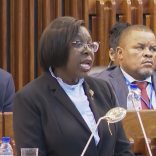
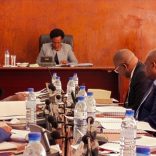
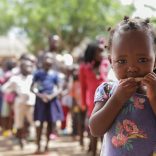


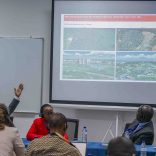




Leave a Reply
Be the First to Comment!
You must be logged in to post a comment.
You must be logged in to post a comment.